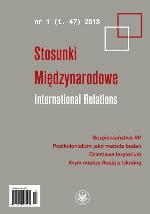Bezpieczeństwo w polityce zagranicznej RP rządu koalicji Platformy Obywatelskiej i Polskiego Stronnictwa Ludowego
Security in Poland’s Foreign Policy of the Coalition Government of Civic Platform and Polish Peasant Party
Author(s): Ryszard ZiębaSubject(s): Politics / Political Sciences
Published by: Wydawnictwa Uniwersytetu Warszawskiego
Keywords: bezpieczeństwo; polityka zagraniczna Polski; organizacje międzynarodowe; security; foreign policy of Poland; international organizations
Summary/Abstract: The starting point is the theoretical coverage of security as an existential goal of the state’s policy, implemented by its different internal policies and the foreign policy. Then, the paper presents the grasp of security in the concept of the foreign policy of the Government of Civic Platform (PO) and the Polish Peasant Party (PSL) in the period of 2007-2013, especially contained in the document entitled Priorities of Polish Foreign policy 2012-2016. It indicates that the concept of the Polish foreign and security policy is based on two principal pillars, such as NATO and the European Union. The carried out Polish foreign policy shows that of the crucial importance for the security of Poland is its membership in NATO. Poland joined NATO, driven by a desire to obtain effective security guarantees. It stresses the importance of continued commitment of allies to grant each other mutual assistance in the event of the armed aggression carried out from outside (Article 5 of the North Atlantic Treaty). Poland advocates for expanding NATO to the East in order to extend the zone of stability, democracy and security. The problem for Poland, though, is how to arrange its relations with Russia, which is perceived as posing a threat to us. Poland makes endeavours to maintain an effective political-military presence of the United States in Europe, including our country, and the strengthening of the transatlantic link. The second pillar of Poland’s security is the European Union. To this end, the PO/PSL government tightly engages in the process of the European integration and the strengthening of the EU Common Security and Defence Policy. In the second case, it closely interacts with Germany and France within the framework of the Weimar Triangle and advocates for updating or the elaboration of a new security strategy of the European Union. A shortcoming in the Polish foreign policy and security policy is underestimating – after accession to NATO and the EU – the OSCE as the widest organisation that groups 57 member states of the Euro-Atlantic zone. This makes a broad holistic approach to shaping international security diffi cult, taking into account soft aspects of security. The Polish policy towards the OSCE is inconsistent, because next to underestimating this organization, we can see another tendency to turn to dialogue in the Corfu Process and in the conceptual work on the creation of the Euro-Atlantic and Eurasian security community. Today, persistent state security in the international arena can be built not only on „hard guarantees”. Also, there is need to supplement them with „soft” protections, and to see the growing interdependence of security of other states throughout the OSCE area, as they are facing the same or similar security challenges. The essential question for the Polish leaders is whether they can read this interdependence and adjust to it international security arrangement, so as to build an additional se
Journal: Stosunki Międzynarodowe
- Issue Year: 47/2013
- Issue No: 1
- Page Range: 9-33
- Page Count: 25
- Language: Polish

